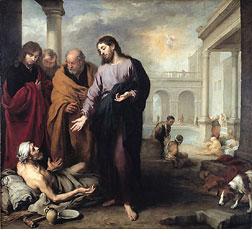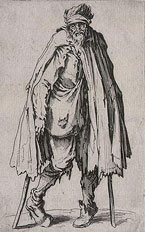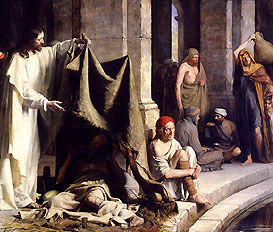
Resisting
Healing
by Deborah Beach Giordano
I Can't
 Traditionally the man at the pool at Bethesda has taken a lot of flak over his hesitance — if not outright unwillingness — to be healed.
Traditionally the man at the pool at Bethesda has taken a lot of flak over his hesitance — if not outright unwillingness — to be healed.
It’s hard to understand why, given the opportunity, anyone would hold on to an illness. Yet when Jesus asks him if he wants to be made well, the man doesn’t shout, “Oh yes!!!” — instead, he makes excuses for why he “can’t” be healed.
I’ve always wondered about the fellow, and tried to understand his situation. Why does he respond to the Lord as he does? Fear of disappointment? Doubt? Despair? I’ve made excuses and created justifications, but the reason behind his answer has remained elusive. Until last week.
Over at the Pool
On an overnight trip out of town we went to a restaurant that friends had recommended. It was Saturday morning breakfast and the place was abuzz. While we were waiting, I watched the young man who was working as the greeter/seater.
 You could say he was handicapped, but that holds little meaning: a “handicap” can be anything from mild deafness to muscular dystrophy. To be precise: the fellow was lame. He had severe impairment to his left leg: it did not bend at the knee or the ankle.
You could say he was handicapped, but that holds little meaning: a “handicap” can be anything from mild deafness to muscular dystrophy. To be precise: the fellow was lame. He had severe impairment to his left leg: it did not bend at the knee or the ankle.
I know several folks who are dealing with disabilities, and they impress, inspire, and often amaze me by their courage, strength, and adaptability. They don’t allow their diseases or limitations to define or confine them. But this young man was quite different.
What first drew my attention was the way he moved. There was a sense of anger; rage directed toward the uncooperative limb: as he moved it was as if he flung his leg away from him — scowling with every step.
Beyond that was his attitude toward the customers, which was nothing short of rude. He was abrupt and dismissive to everyone, and particularly unpleasant to his coworkers.
I wasn’t the only one who noticed his behavior. A woman sitting next to me leaned over and said softly to her friend, “Poor soul, it must be a terrible cross to bear; being a cripple like that.”
A Cripple
 Her words rang in my ears. I hadn’t heard the word “cripple” in a long time — we’re all so carefully PC in our language these days! Yet it was precisely what the young man was. Not in his body so much as in his spirit.
Her words rang in my ears. I hadn’t heard the word “cripple” in a long time — we’re all so carefully PC in our language these days! Yet it was precisely what the young man was. Not in his body so much as in his spirit.
It seemed that his handicap provided him with an excuse to be angry and hostile; it gave him a free pass to treat others with disrespect and unkindness. As long as he was an invalid, he could forget about anyone else.
And I thought about the man by the pool of Bethesda who was unwilling to give up his disease. Maybe he had come to enjoy the pity of those around him. Perhaps he had developed a liking for a situation that gave him tacit permission to be nasty and self-absorbed. Perhaps he had become an “emotional cripple.”
Closer to Home
Of course it’s always easy to recognize the sins and shortcomings of others. It’s harder to see the ways in which we ourselves may be crippled.
 How often have you said, “I’m having a bad day,” as an excuse for being short-tempered or crabby? I know I’ve done it a hundred times. As if an hour sitting in traffic or a malfunctioning dishwasher or a computer crash makes it ok to be thoughtless or mean! Is our faith that fragile; is our belief that God can make all things (even lost files!) work together for good that easily overcome?
How often have you said, “I’m having a bad day,” as an excuse for being short-tempered or crabby? I know I’ve done it a hundred times. As if an hour sitting in traffic or a malfunctioning dishwasher or a computer crash makes it ok to be thoughtless or mean! Is our faith that fragile; is our belief that God can make all things (even lost files!) work together for good that easily overcome?
That Was Then
Even more tempting is the desire to hold on to the hurts and disappointments in our histories. The hateful people, bad things, and harmful experiences we have suffered can readily be put to use to justify our own (self-)damaging behaviors.
As long as we refuse to be healed from our unhappy childhood / marriage / divorce / education / job / church / family / relationships — we remain crippled by the harm that was done. When we allow our present to be controlled by our past, we will limp through life using “what was” as a crutch, rather than daring to walk boldly in the light of the Lord Jesus’ Gospel.
In Christ we have been healed of the sins that have sickened and constrained us: our own sins, and the sins of others against us. That is the curative power of forgiveness.
Real-Time Realities
Yes, we have challenges to face, problems to overcome, troubles to endure — but those things do not define us. We are, first and foremost, Christians. Through the power of our baptism we were born anew as citizens of God’s holy kin-dom where love is the law (Jn 13:34); a land in which compassion, kindness and mercy rule over all.
Following the path the Lord walked is the best way to live — but it isn’t always the easiest. We will always be tempted to slide into despondency, to indulge in self-pity, to be short-tempered, crabby, and judgmental. Our own troubles are always easier to see than those of others, and our own failings harder to recognize.

I think that’s why Jesus tells the (perhaps still unwillingly-healed) man from Bethesda to avoid sinning, “lest something worse” happen to him. It isn’t a warning that God will send a new and terrible ailment as punishment, nor the threat of damnation to hell: it is a caution against remaining a spiritual invalid. All other diseases and disabilities may be overcome, but a sick soul cripples us for as long as we live.
May Christ’s healing light shine upon you always.
Virtual hugs and real-time blessings,
Deborah +
Suggested Spiritual Exercise
As you look over your life, in what ways has God made “all things work together for good” — especially the the things that seemed disastrous at the time? Can you imagine how some of the challenges you face today may become good things?